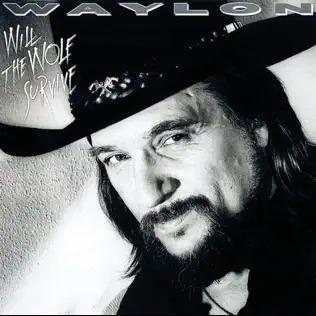Will the Wolf Survive
| Will the Wolf Survive | ||||
|---|---|---|---|---|
 |
||||
| Studio album by Waylon Jennings | ||||
| Released | March 10, 1986 | |||
| Recorded | 1986, Emerald Studio, Nashville | |||
| Genre |
Country Outlaw country |
|||
| Label | MCA | |||
| Producer | Jimmy Bowen, Waylon Jennings | |||
| Waylon Jennings chronology | ||||
|
||||
| Professional ratings | |
|---|---|
| Review scores | |
| Source | Rating |
| Allmusic |
|
Will the Wolf Survive is an album by Waylon Jennings, his debut for MCA Records.
Will the Wolf Survive was Jennings' first release on MCA after moving from RCA, where he had recorded since 1966. His debut album with the label was produced by Jimmy Bowen, who updated the singer's sound from the outlaw country sound that some critics felt had gone stale on albums like Black on Black and It's Only Rock & Roll. Drug-free for nearly two years, the album was a fresh start for Jennings, who had seen his commercial standing slip in recent years after ruling the country charts for most of the 1970s and early 1980s. Jennings, who resurfaced in the public consciousness as part of the successful Highwaymen collaboration with fellow outlaws Willie Nelson, Kris Kristofferson, and Johnny Cash, embraced the changes to his sound after spending many years fighting the Nashville system for the right to produce his own records and use his own band in the studio. Featuring more elaborate musical arrangements than the stripped down, hard-driving records he had become famous for, Will the Wolf Survive was recorded digitally. It proved a greater commercial success than the singer's previous several releases, the peak of Jennings' popularity having passed. Some tracks, such as "Where Does Love Go" and "Suddenly Single," have a glossy, contemporary sound typical of Bowen at the time that dates them to an extent, but Jennings singing is characteristically strong. The well-known title track, originally performed by Los Lobos, was the album's most successful single, reaching #5 on the country charts, and can be interpreted as Jennings' own personal statement about his past battles with the music industry and his own ongoing sobriety. The theme of sobriety is also explored on "Working Without a Net," which reached #7 on the charts and finds the singer contemplating touring without the crutch of drugs ("Up on the high wire, the crowd begins to call/Some want you to fly, some want to see you fall"). "What'll You Do When I'm Gone" also made the Top 10, peaking at #8. Steve Earle's "The Devil's Right Hand", first performed on this album, would go on to be covered once more by Jennings, this time with the Highwaymen, on 1995's The Road Goes on Forever.
...
Wikipedia
